British and Colonial Antecedents of American Liberties:
An exhibition of rare books on early American law from the collection of Sid Lapidus at the Wolf Law Library, William & Mary Law School, October 1, 2019 – March 15, 2020
GOVERNMENT AND POLITICS
|
Magna Charta (1680) Little is known about the author other than his efforts as a writer to support the Whig movement to exclude James, Duke of York from the English throne. He produced this version of the Magna Carta with that movement in mind, using reference's to Sir Edward Coke's (1552–1634) Second Institute to interpret the law. |
|
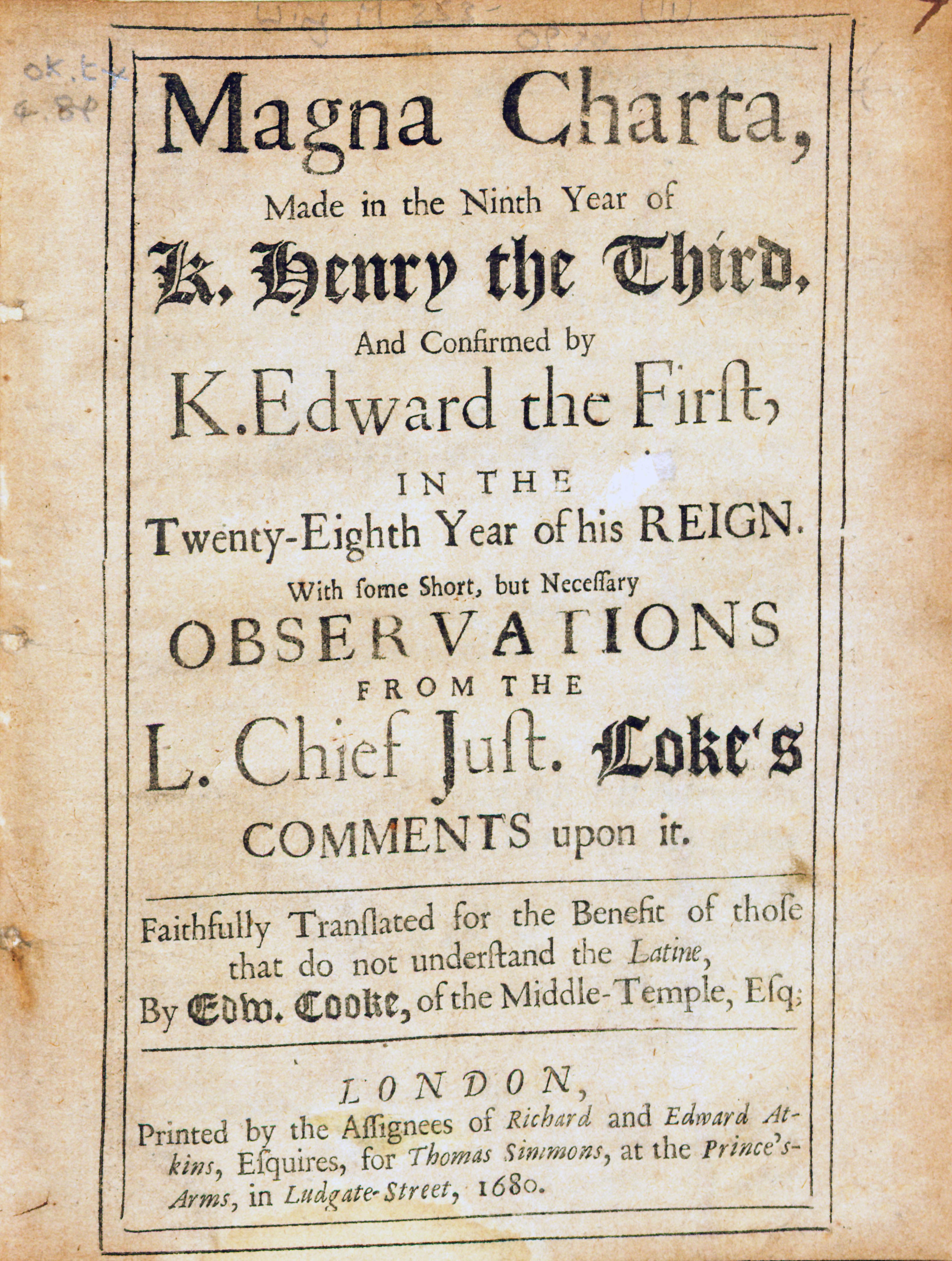
|
Cooke, Edward. Magna Charta, made in the Ninth Year of King Henry the Third and Confirmed by K. Edward the First ... with Some Short, but Necessary Observations from the L. Chief Just. Coke's Comments upon it. London: Printed by the Assignees of Richard and Edward Atkins for Thomas Simmons, 1680. |
|
The Institutes of the Laws of England (1651) Composed to prepare for the union of the English and Scottish legal systems, John Cowell (1554–1611) crafted his work along the lines of Justinian's Institutes. He highlighted the similarities between common law and civil law and provided a general overview of the distinguishing features of each. While its combination of subjects foreshadowed what would become accepted practice for English legal education, the work suffered from its attempt to force English law into the model of the Institutes and it never enjoyed commercial success. |
|
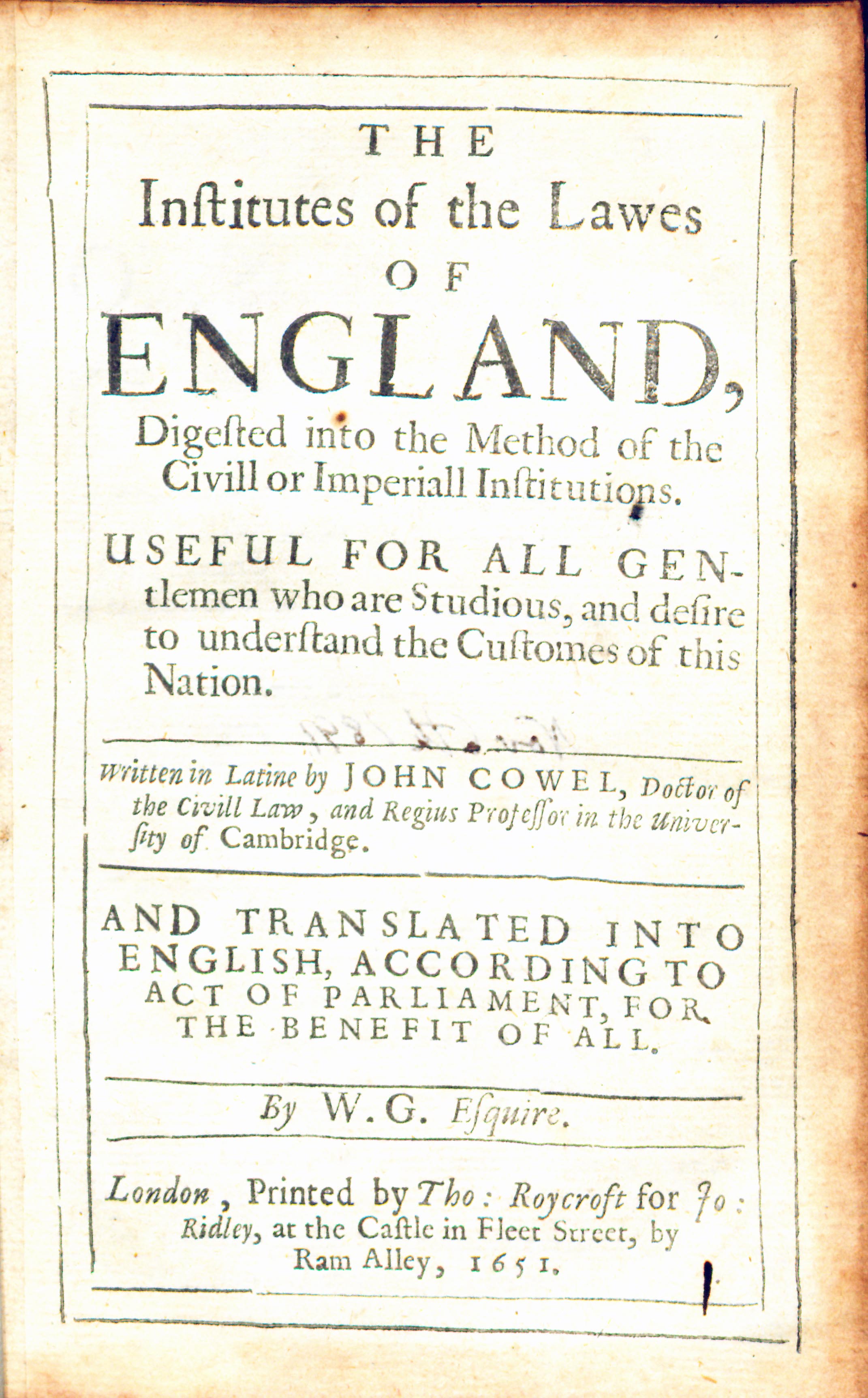
|
Cowell, John. The Institutes of the Laws of England, Digested into the Method of the Civill or Imperiall Institutions, Useful for all Gentlemen who are Studious and Desire to Understand the Customes of this Nation. Translated by W. G. 1st English ed. London: Printed by Tho. Roycrofth for Jo. Ridley, 1651. |
|
The Several Opinions of Sundry Learned Antiquaries (1658) In The Several Opinions, Sir John Doddridge (1555–1628) briefly reviews the history of Parliament, its jurisdiction, and the pivotal role it plays as part of the English government. Published thirty years after the author's death, the small volume includes many sentiments that would later be expressed by English Whigs and their colonial cousins. This copy features two signatures of prior owners on the title page. |
|
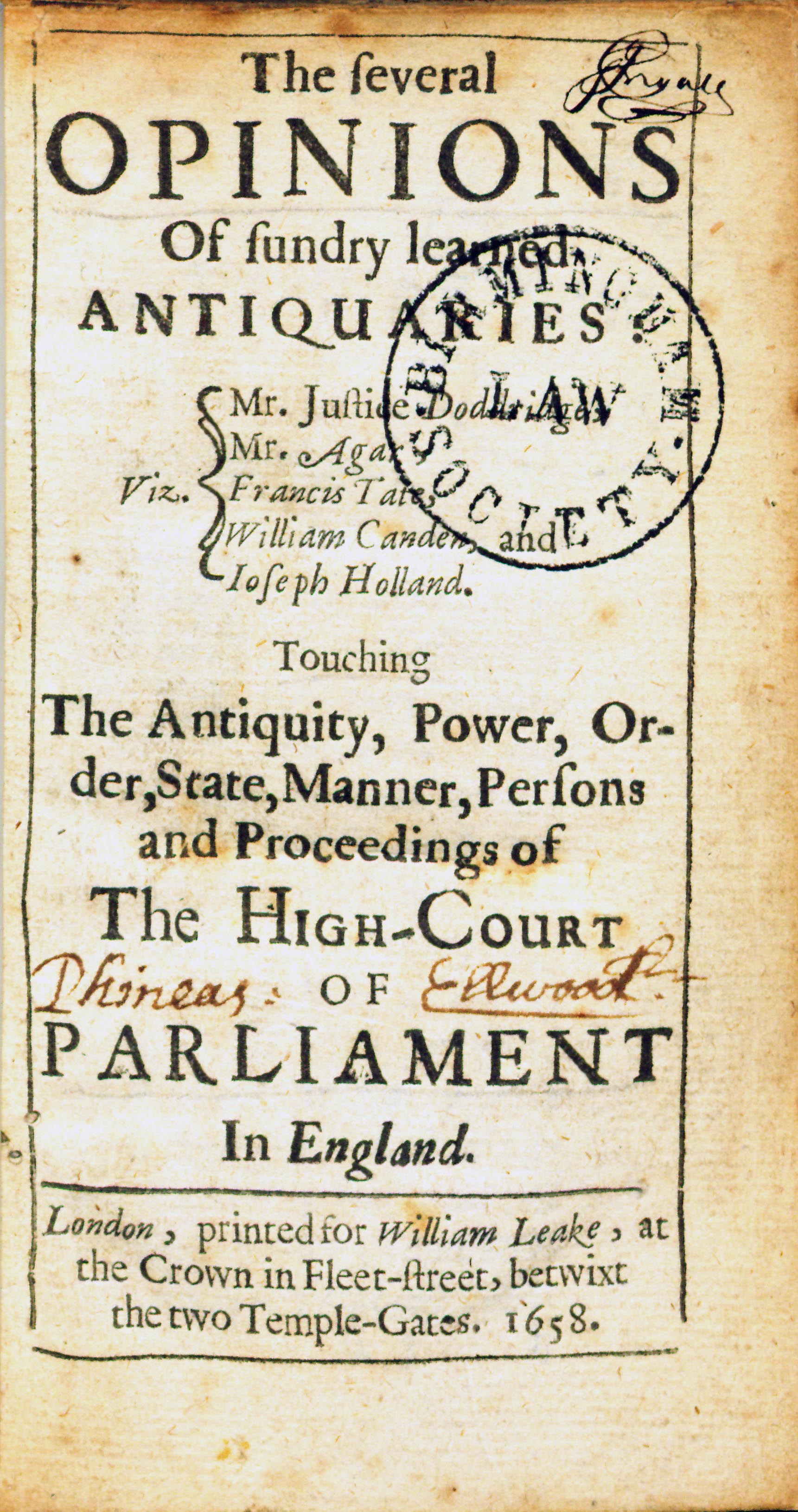
|
Doddridge, Sir John. The Several Opinions of Sundry Learned Antiquaries ... Touching the Antiquity, Power, Order, State, Manner, Persons and Proceedings of the High-Court of Parliament in England. London: Printed for William Leake, 1658. |
|
The Ancient and Present Manner (1663) and The Ancient Method and Manner (1660) In this work, Henry Elsynge (bap. 1577–1635), a parliamentary official, created an authoritative and concise description of contemporary parliamentary procedure. In doing so, he played an essential role in the preservation of parliamentary history and records. Multiple editions followed the first which was published in 1660. |
|
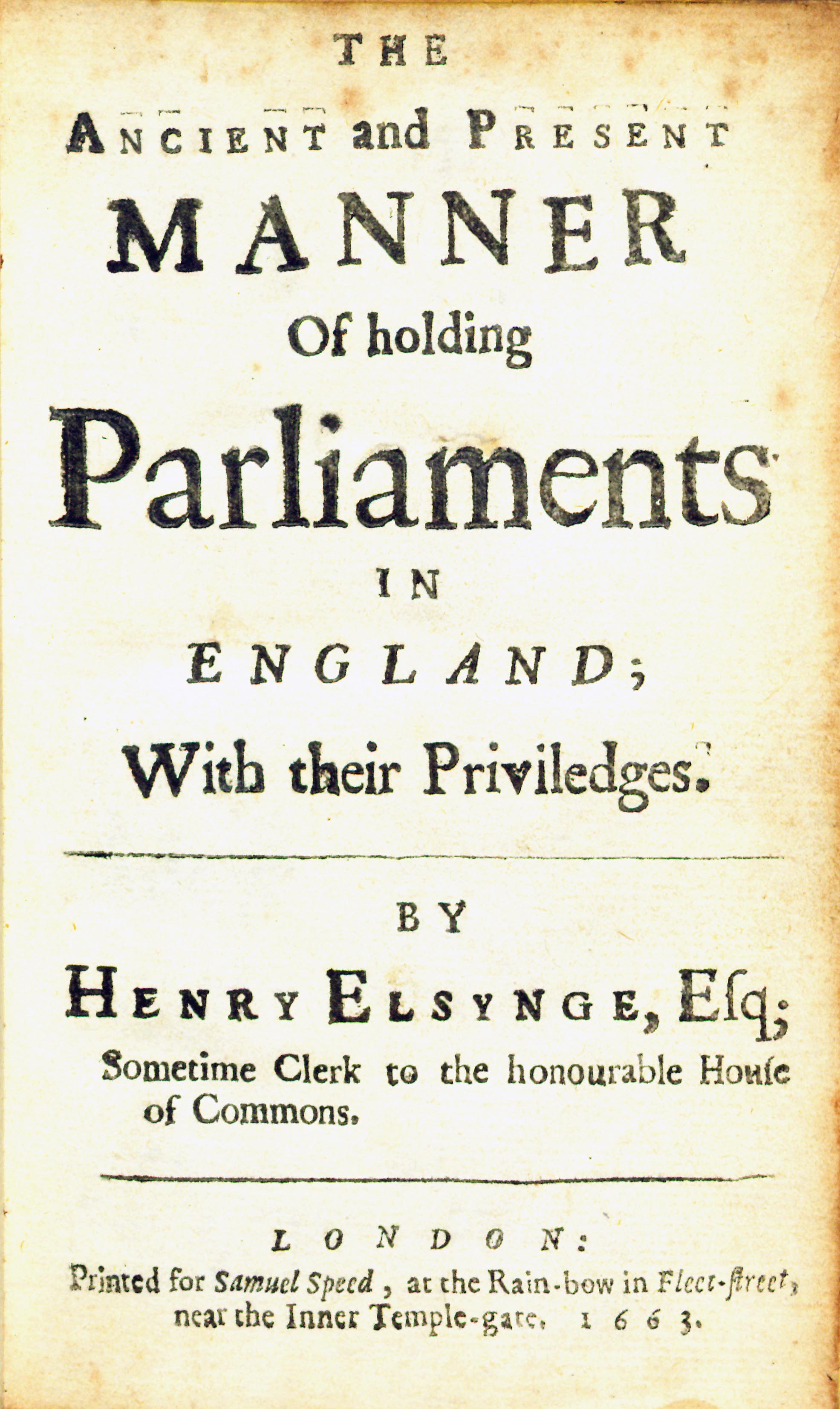
|
Elsynge, Henry. The Ancient and Present Manner of Holding Parliaments in England with Their Priviledges. London: Printed for Samuel Speed, 1663. |
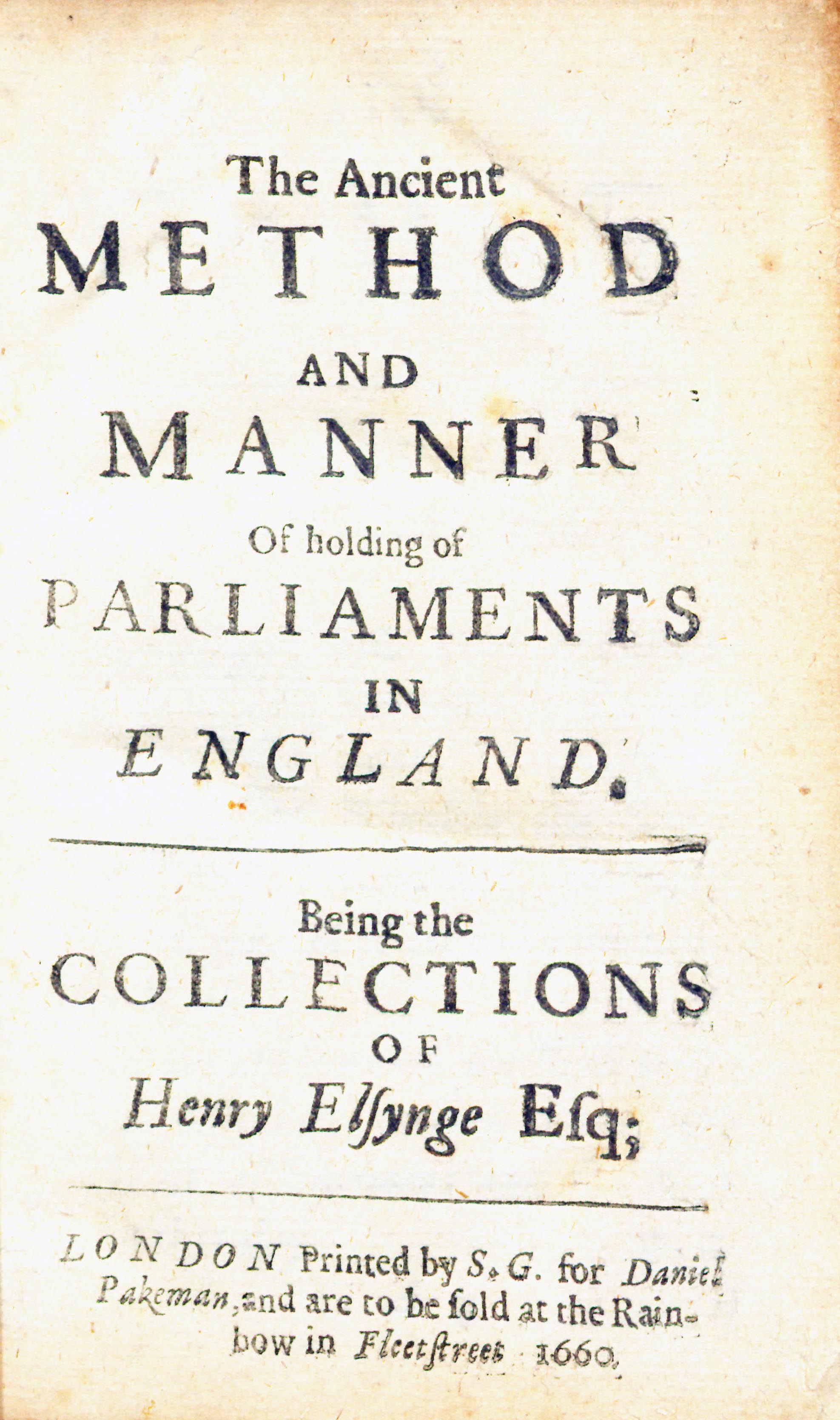
|
Elsynge, Henry. The Ancient Method and Manner of Holding of Parliaments in England. 1st ed. London: Printed by S.G. for Daniel Pakeman, 1660. |
|
Ephemeris Parliamentaria (1654) A clergyman and historian, Thomas Fuller (1607/08–1661) compiled Ephemeris Parliamentaria as a record of recent events. In gathering the speeches of both Royalists and Roundheads, he hoped to establish the antecedents of the English Civil War. A seminal work in Parliamentary history, it represents the first printed collection of Parliamentary addresses. This copy includes the armorial bookplate of Sir Frederick Evelyn on the front pastedown. |
|
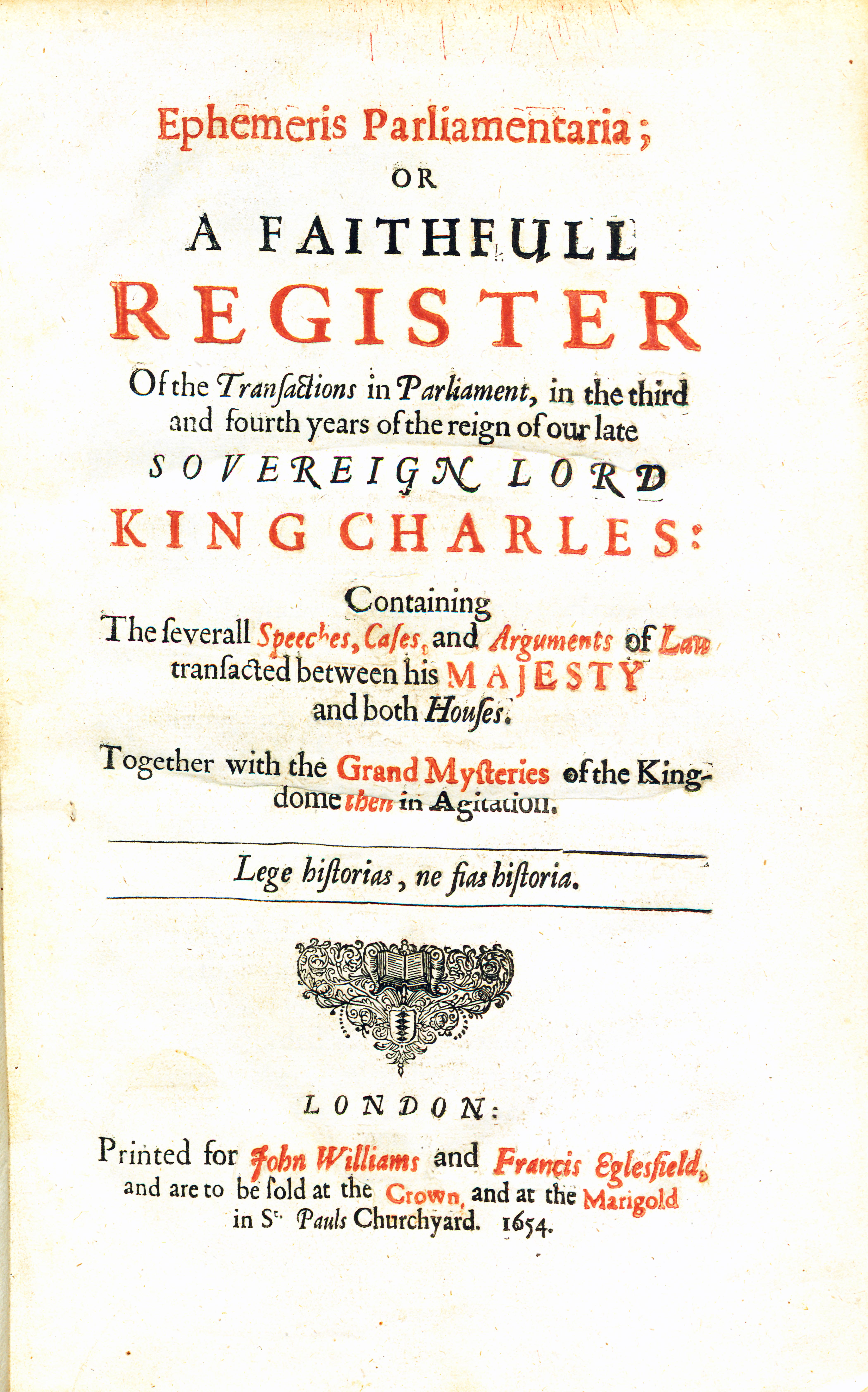
|
Fuller, Thomas. Ephemeris Parliamentaria; or a Faithfull Register of the Transactions in Parliament, in the Third and Fourth Years of the Reign of Our Late Sovereign Lord King Charles. London: Printed for John Williams and Francis Eglesfield, 1654. |
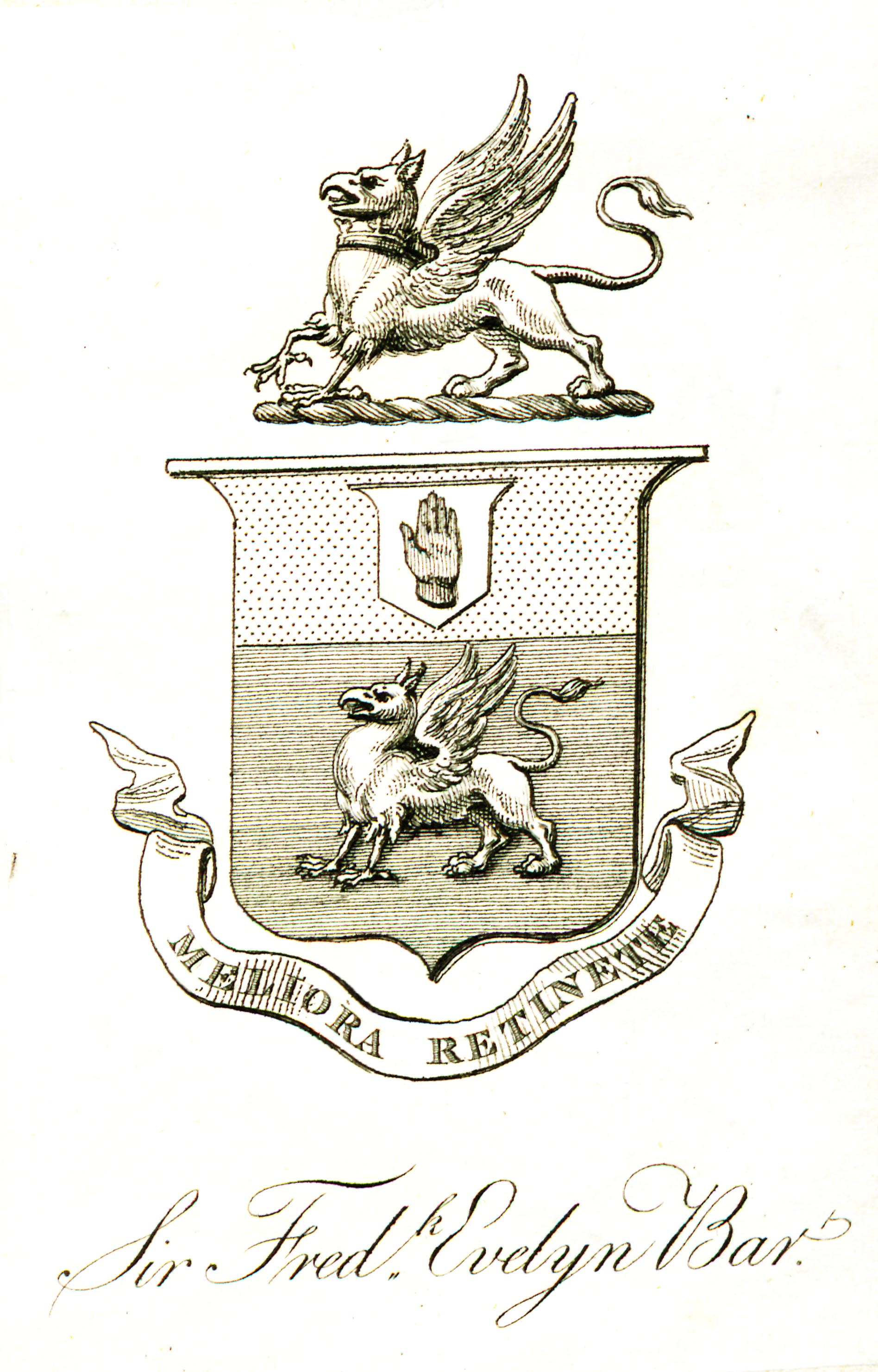
|
Bookplate of Sir Frederick Evelyn, 3rd Baronet, in Thomas Fuller's Ephemeris Parliamentaria, 1654. |
|
The Oceana (1700) An author whose works influenced both the American and French revolutions, James Harrington (1611–1677) envisioned a commonwealth based on equality. Although based on a fictional domain, Harrington's major work, The Commonwealth of Oceana, outlines a tripartite government and provides practical suggestions for a republican constitution. This copy of the first compilation of Harrington's works is from the Wolf Law Library's George Wythe Collection. |
|
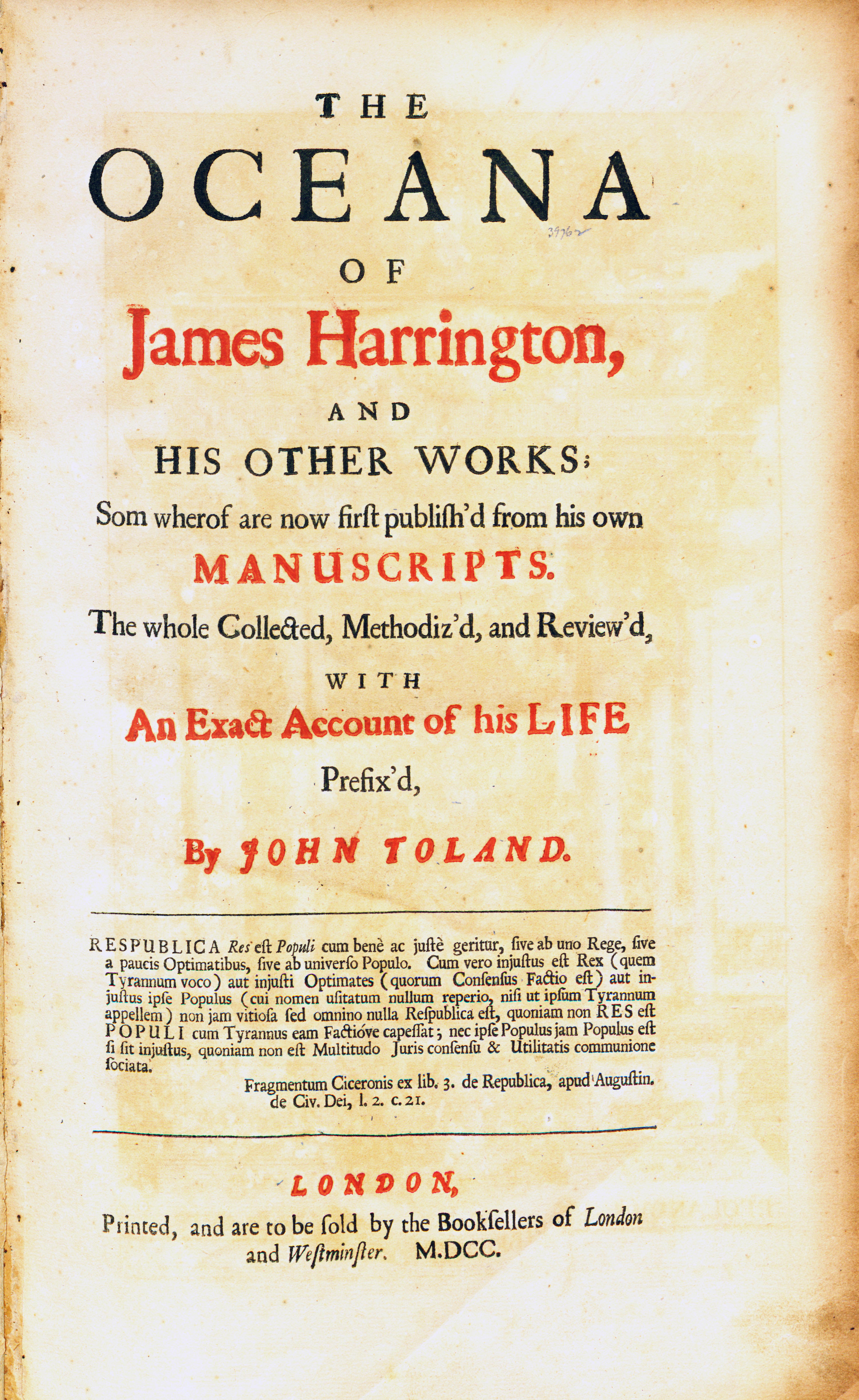
|
Harrington, James. The Oceana of James Harrington, and His Other Works. London: Printed by the Booksellers of London and Westminster, 1700. Wolf Law Library. |
|
Utopia (1663) Sir Thomas More (1478–1535) first published his socio-political satire in 1516. In the form of a dialogue, More identifies problems with the current state of law and society and introduces the fictional, perfected location, Utopia, where these problems do not exist. Claimed by both Catholics and Communists as a statement of seminal value, Utopia has enjoyed popularity since its original publication. Nevertheless, scholars continue to disagree about More's message and his reasons for writing the book. |
|
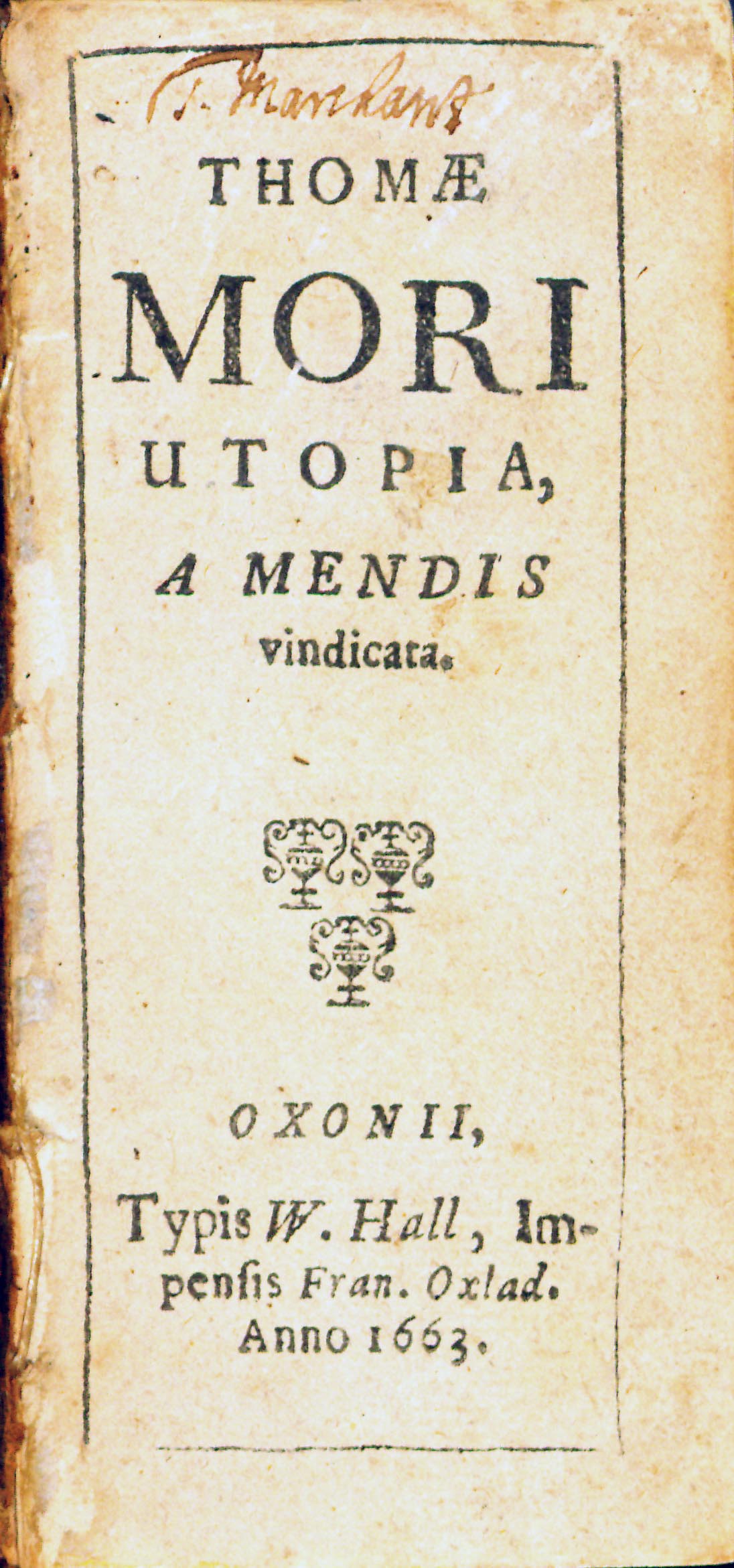
|
More, Sir Thomas. Thomae Mori Utopia, a Mendis Vindicata. Oxonii: Typis W. Hall, Impensis Fran. Oxlad., 1663. |
|
The Constitution of Parliaments in England (1680) In this work, |
|

|
Pettus, Sir John. The Constitution of Parliaments in England, Deduced from the time of King Edward the Second. London: Printed for the Author, 1680. |
|
The Antient Right of the Commons of England Asserted (1680) William Petyt (1640/41–1707) wrote this treatise to combat the Tory arguments of Sir Robert Filmer (c. 1588–1653) and Robert Brady (1627–1700) which called into question the foundations of the ancient constitutionalist cause. The Ancient Right, a fundamental work from the Whig perspective, counters the Tory position. In it, Petyt defends both the equal standing of the House of Commons and the conviction that the natural rights and liberties of Englishmen were customary rights, immutable and primeval. These assertions, transmitted through The Ancient Right and Petyt's other essays on Whig ideology, would inform the development of similar ideas in the colonies. |
|
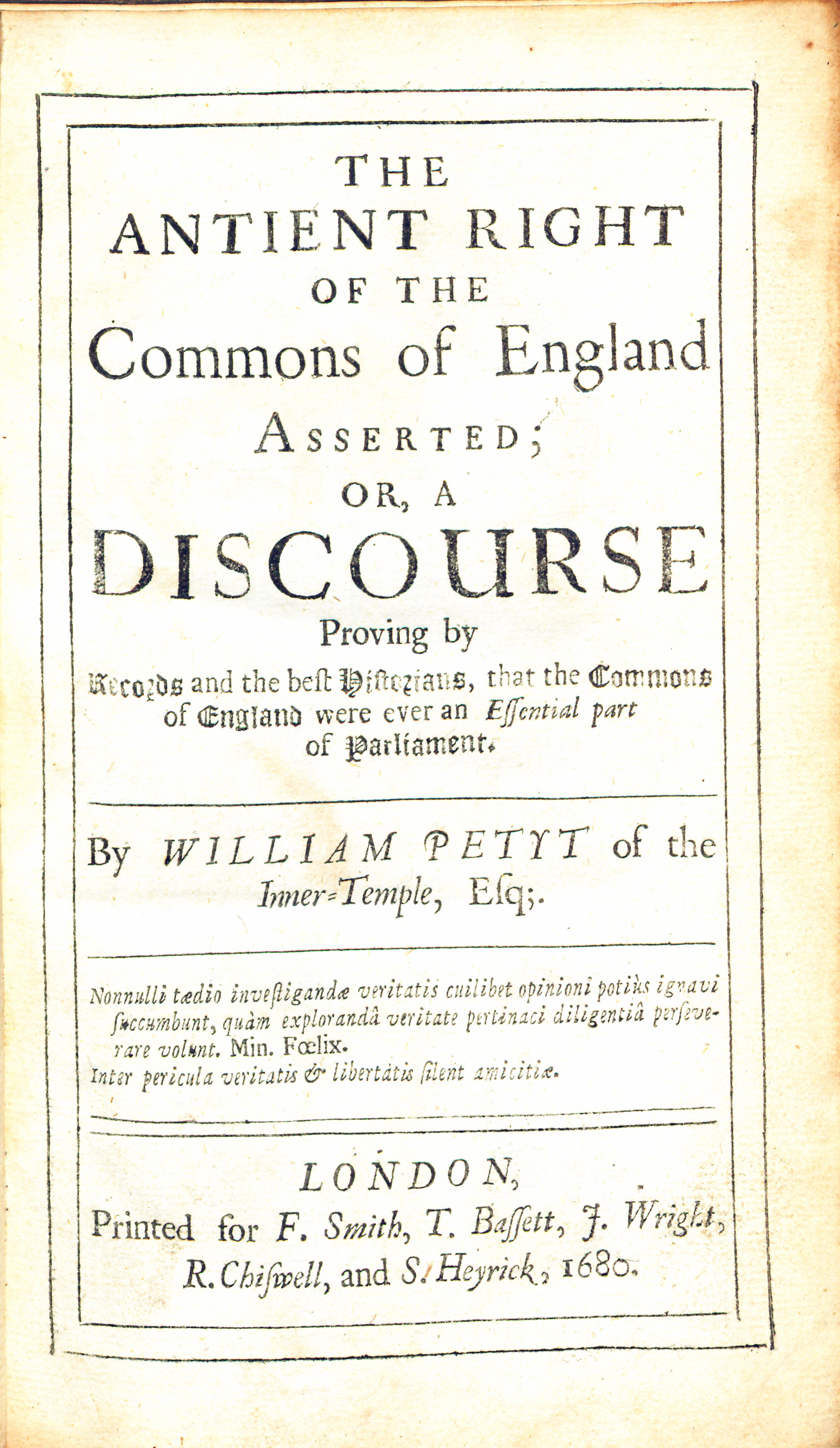
|
Petyt, William. The Antient Right of the Commons of England Asserted; or, a Discourse Proving by Records and the best Historians, that the Commons of England were Ever an Essential Part of Parliament. London: Printed for F. Smith, T. Bassett, J. Wright, R. Chiswell, and S. Heyrick, 1680. |
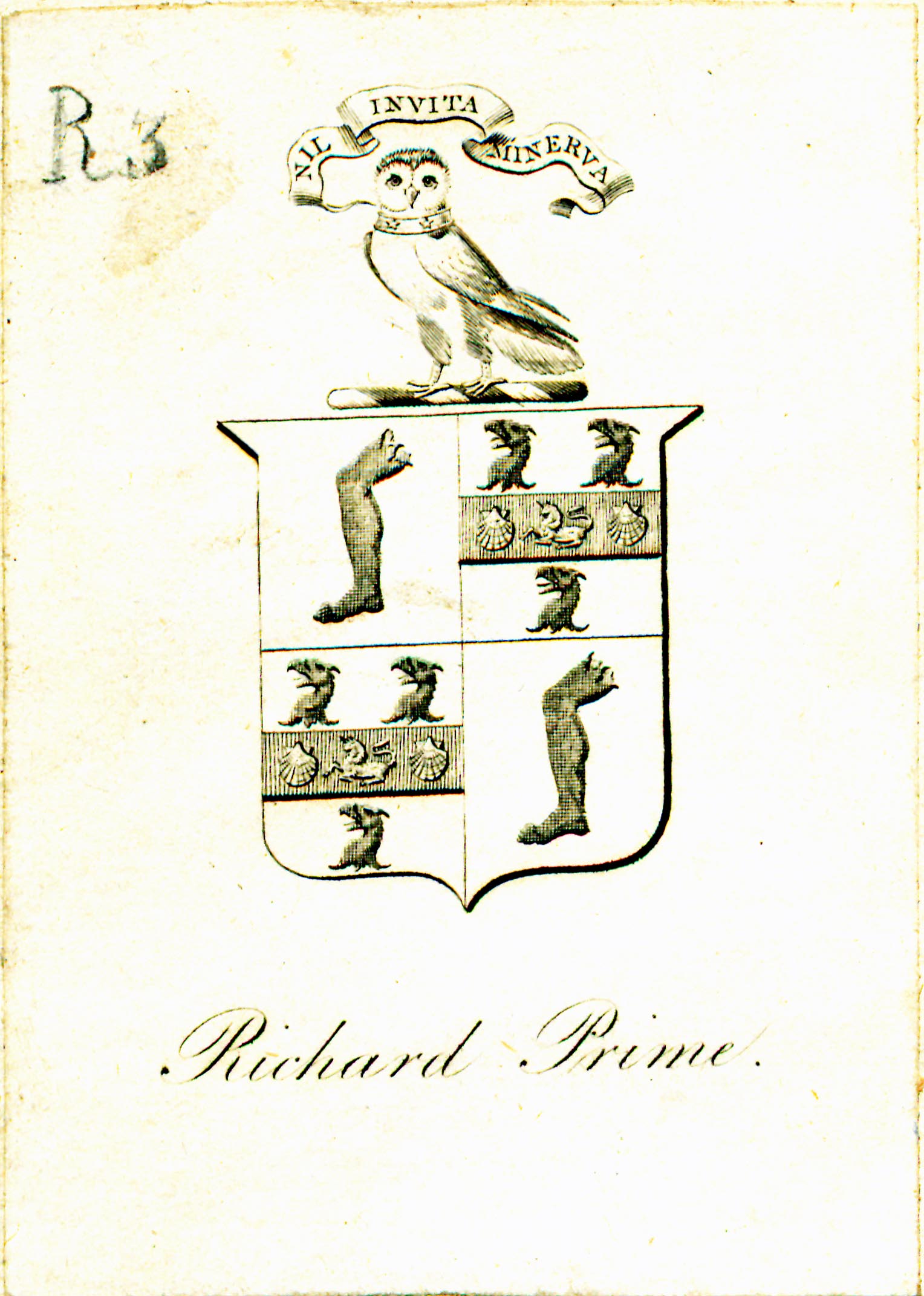
|
Bookplate of Richard Prime, in William Petyt's The Antient Right of the Commons of England Asserted, 1680. |
|
Of the Antient Lawes of Great Britaine (1605) George Saltern created this book in support of James I and VI's desire for a union of England and Scotland and their respective legal systems. Saltern addresses fears that the addition of one set of laws to the other would damage the rights and liberties of both. In doing so, he stands apart from other Unionist authors by invoking the idea of an existing common legal heritage. |
|
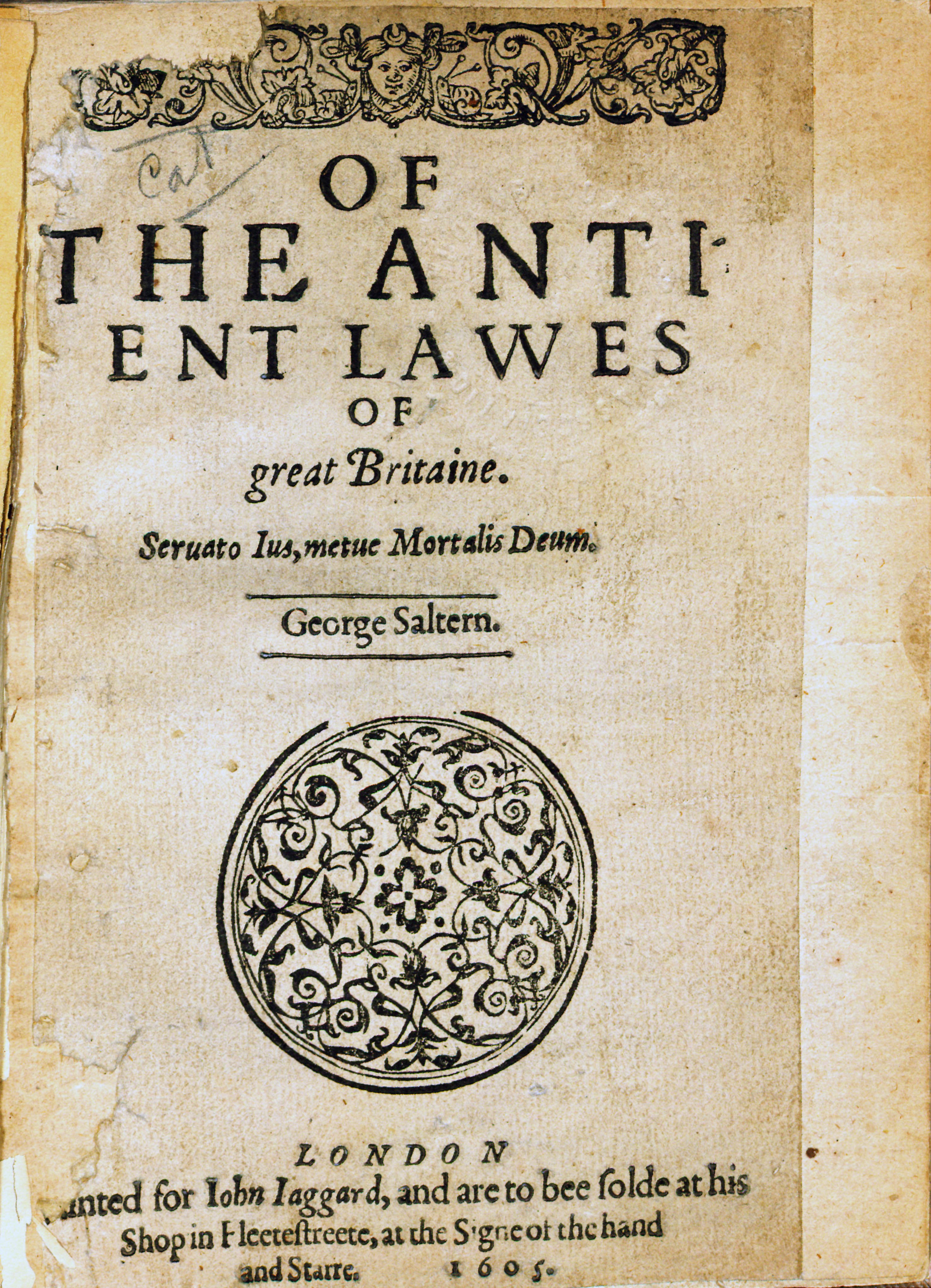
|
Saltern, George. Of the Antient Lawes of Great Britaine. 1st ed. London: Printed for John Jaggard, 1605. |
|
De Republica Anglorum (1583) Written in 1565 and first published in 1583, De Republica Anglorum immediately became an influential work on the nature of politics and constitutional law in Elizabethan England. Sir Thomas Smith (1513–1577) compares the government of England with those of other countries such as France, Italy, Germany and Spain, describing in some detail the various governmental institutions in England. One of the first treatises in comparative politics, it was published in eleven English editions and four Latin over the course of the next century. |
|

|
Smith, Sir Thomas. De Republica Anglorum: The Manner of Governement or Police of the Realme of England. 1st ed. London: Printed by Henrie Midleton for Gregorie Seton, 1583. |
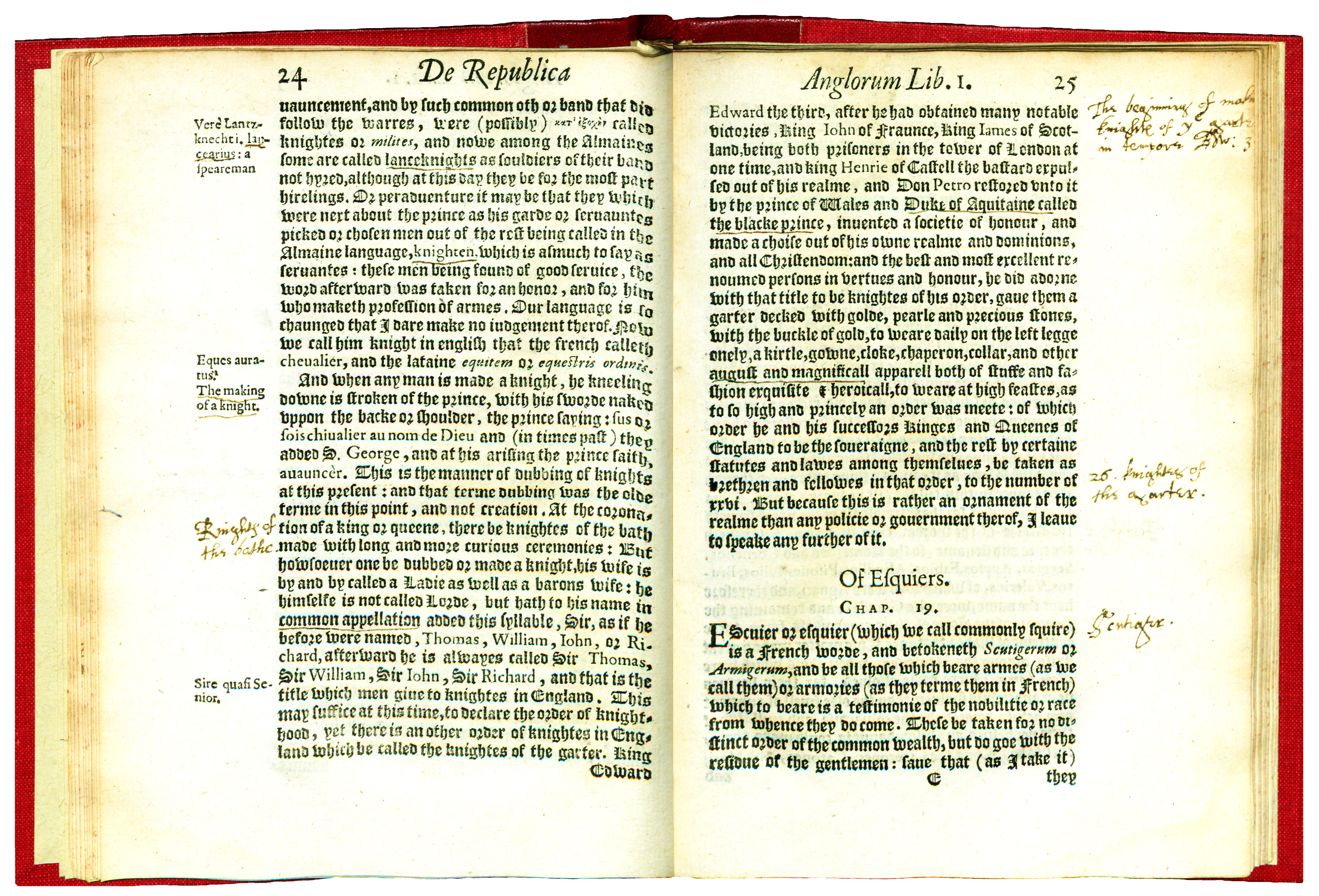
|
Pages 24 and 25 of Sir Thomas Smith's, De Republica Anglorum, 1583, with previous owner's marginalia and underlining. |



